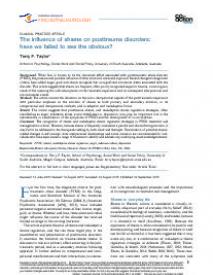The influence of shame on posttrauma disorders: have we failed to see the obvious?
Background: While fear is known to be the dominant affect associated with posttraumatic stress disorder (PTSD), the presence and possible influence of other emotions is less well explored. Recent changes to diagnostic criteria have added anger, guilt and shame alongside fear as significant emotional states associated with the disorder. This article suggests that shame is a frequent, often poorly recognised sequel to trauma, occurring as a result of the meaning the individual places on the traumatic experience and on subsequent interpersonal and environmental events.
Methods: The article reviews the literature on the socio-interpersonal aspects of the posttraumatic experience with particular emphasis on the emotion of shame as both primary and secondary emotion, in its intrapersonal and interpersonal contexts, and in adaptive and maladaptive forms.
Results: The review suggests that posttrauma shame, and maladaptive shame regulation strategies, often manifesting as anger, substance abuse, social withdrawal or depression, may play an important role in the maintenance or exacerbation of the symptoms of PTSD and the development of co-morbidities.
Conclusion: The recognition of shame and maladaptive shame regulation strategies in PTSD treatment and management is critical. However, because shame is frequently considered a painful and discomforting emotion, it may fail to be addressed in the therapeutic setting by both client and therapist. Examination of potential shame-related changes in self-concept, close interpersonal relationships and social inclusion are recommended for individuals who have experienced a range of traumas to identify and address any underlying unacknowledged shame.
Geachte bezoeker,
De informatie die u nu opvraagt, kan door psychotraumanet niet aan u worden getoond. Dit kan verschillende redenen hebben,
waarvan (bescherming van het) auteursrecht de meeste voorkomende is. Wanneer het mogelijk is om u door te verwijzen naar de bron
van deze informatie, dan ziet u hier onder een link naar die plek.
Als er geen link staat, kunt u contact opnemen met de bibliotheek,
die u verder op weg kan helpen.
Met vriendelijke groet,
Het psychotraumanet-team.
Reference:
Terry F. Taylor | 2015
European journal of psychotraumatology, ISSN 2000-8066 | 6 | 28847
European journal of psychotraumatology, ISSN 2000-8066 | 6 | 28847


